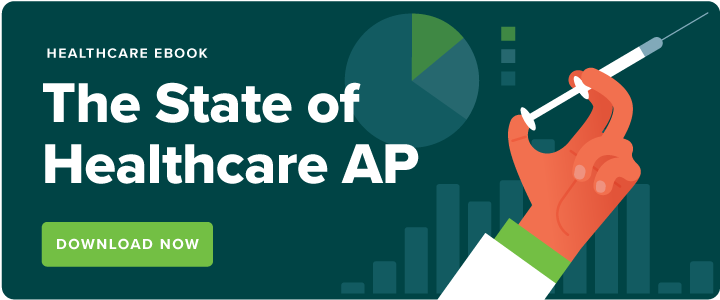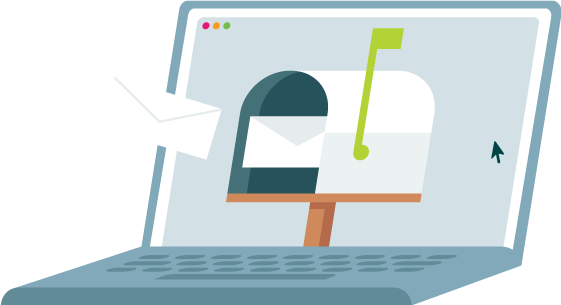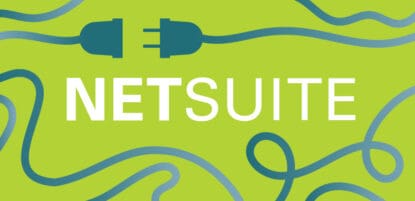Cash flow, credit ratings, and supplier relationships are all crucial facets of a successful healthcare business. Paying your bills on time plays a big role in all three factors. Organizations in the healthcare industry cannot afford to miss payment windows.
Missed or overdue payments can wreak havoc on cash flow, cost a bundle in late fees, and damage supplier relationships, potentially bringing to a halt the flow of goods and services that are essential to delivering care. Plus, your organization’s good credit relies on on-time payments.
Getting a better handle on your accounts payable systems and processes can help your healthcare accounting team make payments on time, every time, leading to enhanced business success and, ultimately, higher quality patient care. Because when you drill down, the mission of the healthcare industry is to deliver the best possible care to patients, and every other facet of your organization should help meet that goal.
Let’s explore the important role accounts payable plays in the success of your business and how you can optimize your accounts payable systems and processes for greater efficiency.
Who Handles Accounts Payable in Healthcare?
In a healthcare organization, the accounts payable department is typically responsible for handling all aspects of the organization’s accounts payable process. This includes issuing and tracking invoices, processing and paying vendor bills, reconciling vendor statements, and maintaining accurate records of all accounts payable transactions. The accounts payable department may also be responsible for working with the organization’s finance team to manage cash flow and ensure that all payments are made in a timely and accurate manner. Depending on the size and structure of the healthcare organization, the accounts payable department may be a standalone unit or it may be part of the finance or accounting department.
Why Is Accounts Payable So Important for Health Systems to Understand?
Your accounts payable processes affect your organization’s:
- Credit rating
- Cash flow
- Supplier relationships
- Financial security
Without certain financial security, a steady cash flow, and solid supplier relationships, you may run into issues when delivering patient care. For this reason, it is imperative that your health system focuses on developing a well-managed system of accounts payable to ensure your patients are taken care of.
With a manual, paper-based AP process, you can miss payments, which can hurt your business credit rating. It can be harder to secure investment funding with a poor credit rating, so you may also pay more in interest for business loans or financing if you do not pay your bills on time. Additionally, you may not qualify for high-quality business rewards credit cards that can help you earn rebates and put money back into your business.
Similarly, an inefficient AP system means you could miss out on early-pay discounts and even pay late fees that you could easily avoid with the right system. Late payments also strain relationships with your suppliers. They might be less willing to deliver necessary items, especially in times of shortages when supply chains are strained.
Inefficient AP processes, including the use of paper checks, can also put your organization at greater risk of fraud – something most healthcare organizations strive to avoid at all costs.
Essentially, with a poorly managed AP process, you’re jeopardizing patient security and throwing money that could be spent improving your health system out the door. As the healthcare industry moves toward value-based care over a “fee-for-service” pricing structure, streamlined AP is more important than ever before to help secure financial data, save money, and extract the most value from every transaction.
How Does the Process of Accounts Payable Work?
Your system of accounts payable dictates the way you pay your vendors, suppliers, and other bills – from your mortgage or lease to goods and utilities. Simply put, vendors will issue an invoice, either by mail or email. That invoice should get matched up against a purchase order, if applicable. Depending on your organization, an accounting department head, doctor, nurse, or community manager approves the invoice. Then, your AP department issues a payment.
Forms of payment may include:
- Paper checks
- Wire transfer
- ACH direct deposit
- Credit cards
- Virtual card payments
Payments should also be recorded by your accounting department into your ERP for consistency. To help prevent internal occupational fraud, authorization of any payments should be handled by a different person than the individual who created and processed the invoice in the system.
Even as more consumers make the switch to digital payment methods, healthcare organizations seem to be falling behind when it comes to paying suppliers. A survey from PayStream Advisors, a research firm, found that 44% of healthcare organizations still use paper checks to pay their suppliers. What’s more, 36% still receive paper invoices, while 16% use wire transfers, which often carry hefty fees.
According to the PayStream survey, 36% of healthcare organizations use an invoicing system built into their enterprise resource planning (ERP) system, which may not always be the most efficient. Additionally, payment systems may not always integrate with the ERP, adding extra steps to the process of paying suppliers.
Traditional accounts payable systems and processes are costly and leave a lot of room for human error. However, your health system can avoid these risks by leveraging AP automation solutions.
How to Achieve Efficiency with AP Automation Solutions Tailored for Healthcare
Today’s technology offers a vast array of solutions to help organizations manage accounts payable. But a healthcare-focused accounts payable system, specifically designed to meet the unique needs and challenges of healthcare organizations, can provide the flexibility, security, and efficiency you need.
BrightView, a substance use disorder treatment facility clinic with locations across Ohio and Kentucky, was able to streamline their AP process by embracing cloud-based accounting solutions that include AP automation.
Controller Matt Santell explains that when he joined the organization’s finance team, he inherited the accounting processes from an outside CPA firm. Santell had the opportunity to redesign BrightView’s accounting systems from the ground up.
First, he implemented Sage Intacct as the cloud-based accounting solution, and then added other systems to manage various aspects of financial management, including AP. “I like to describe Sage Intacct as kind of an iPhone, and then all these other programs are apps on the iPhone that integrate and work together,” he says. “We have seamless integration between our warehouse of information, our accounting system, and the programs that we use to do the processing.”
Key to the process, Santell says, was adopting MineralTree for AP automation to replace the old, inefficient manual batched AP process. Santell says MineralTree has helped the fast-growing healthcare organization to scale over the past few years. “Having all the automation technology there definitely facilitates our ability to manage growth and to quickly add locations. The data is all there, so we can easily adjust it to meet the needs of our organization,” he says.
Likewise, when the pandemic hit, it was easy to transition the BrightView AP team to remote work. “Having everything already in the cloud made the transition to work from home very smooth,” he says. “Going into the office and processing each check manually, that has to go away. I don’t know how people can do it anymore.”
How MineralTree Helps Healthcare Facilities Manage Accounts Payable
As BrightView saw very soon after implementation, MineralTree carries several advantages over legacy systems and manual invoicing. It integrates seamlessly with your ERP for a streamlined AP workflow and two-way sync of invoice and payment data. It’s easier to manage approvals within an automated system, without relying on personnel to be in the office at the time to review invoices, cross-reference purchase orders, or sign paper checks.
Payments within MineralTree can be scheduled for approval and remittance on their due date, making it easier to manage cash flow, avoid duplicate payments, and earn early-pay discounts, too.
MineralTree provides multiple payment options, including free, secure virtual cards. MineralTree’s SilverPay cards generate a 16-digit virtual account number, or token, which can only be used once by a specific vendor for a set amount of money. Vendors receive the virtual card number via email and process the payment like a credit card transaction. Payments come out of your organization’s bank account, and the resulting information is then recorded within your ERP system for easy payment reconciliation. You don’t need to overhaul your entire accounting system; simply streamline elements like accounts payable through automation.
Virtual cards make it easier and faster to pay your suppliers, which can strengthen supplier relationships. They also support payment-on-demand, ensuring the end of missed payments and late fees. Best of all, you pay no fees on the transactions and can even earn cash back. According to BrightView’s Santell, “We were making these payments anyway, so the fact that MineralTree helps us generate a new revenue stream from them is a huge win. It’s been great for the accounting team to show that we’re not just a cost center—now we’re able to contribute to the company’s financial success, too.”
Today’s healthcare organizations face many challenges as they strive to provide greater value to patients while reducing costs. Your accounts payable system doesn’t have to be part of the struggle when you embrace AP automation.
Healthcare Accounts Payable Automation FAQs
Can Healthcare Accounts Payable be Automated?
Yes! Healthcare Accounts Payable can be automated through vendor payments, cross-border transactions, invoice capture, vendor management, purchase order matching, and more.
What are Accounts Payable in Healthcare?
Accounts payable in healthcare dictates the way you pay your vendors, suppliers, and other bills – from your mortgage or lease to goods and utilities.
What Does an Accounts Payable Clerk do in healthcare?
A healthcare accounts payable clerk will review invoices from vendors to ensure accuracy and validity, process payments, analyze invoices, and more.




